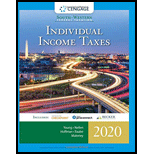
Individual Income Taxes
43rd Edition
ISBN: 9780357109731
Author: Hoffman
Publisher: CENGAGE LEARNING - CONSIGNMENT
expand_more
expand_more
format_list_bulleted
Question
Chapter 1, Problem 19DQ
To determine
Identify whether Person J is under misconception regarding the operation of Federal gift tax and estate tax. Explain.
Expert Solution & Answer
Want to see the full answer?
Check out a sample textbook solution
Students have asked these similar questions
Can you help me? With this question answer general accounting
I need correct solution of this general accounting question
Do fast answer of this question general accounting
Chapter 1 Solutions
Individual Income Taxes
Ch. 1 - Prob. 1DQCh. 1 - Prob. 2DQCh. 1 - The Sixteenth Amendment to the U.S. Constitution...Ch. 1 - Prob. 4DQCh. 1 - How does the pay-as-you-go procedure apply to wage...Ch. 1 - Jane, a tax practitioner, has reviewed the law on...Ch. 1 - Prob. 7DQCh. 1 - Prob. 8DQCh. 1 - Prob. 9DQCh. 1 - Prob. 10DQ
Ch. 1 - Sophia lives several blocks from her parents in...Ch. 1 - Prob. 12DQCh. 1 - Prob. 13DQCh. 1 - Prob. 14DQCh. 1 - Prob. 15DQCh. 1 - Prob. 16DQCh. 1 - Prob. 17DQCh. 1 - Prob. 18DQCh. 1 - Prob. 19DQCh. 1 - Prob. 20DQCh. 1 - Elijah and Anastasia are husband and wife who have...Ch. 1 - What is the difference between the Federal income...Ch. 1 - As to those states that impose an income tax,...Ch. 1 - Prob. 24DQCh. 1 - Prob. 25DQCh. 1 - Prob. 26DQCh. 1 - Prob. 27DQCh. 1 - Prob. 28DQCh. 1 - Contrast FICA and FUTA as to the following: a....Ch. 1 - Prob. 30DQCh. 1 - Prob. 31DQCh. 1 - Prob. 32DQCh. 1 - Prob. 33DQCh. 1 - Prob. 34DQCh. 1 - Serena operates a gift shop. To reduce costs of...Ch. 1 - Prob. 36DQCh. 1 - Prob. 37DQCh. 1 - Prob. 38DQCh. 1 - Prob. 39DQCh. 1 - Prob. 40DQCh. 1 - Prob. 41DQCh. 1 - Prob. 42DQCh. 1 - Prob. 43DQCh. 1 - Prob. 44DQCh. 1 - Prob. 45DQCh. 1 - In terms of tax policy, what do the following...Ch. 1 - Prob. 47DQCh. 1 - Prob. 48DQCh. 1 - Prob. 49DQCh. 1 - Prob. 50DQCh. 1 - Using information from this chapter as well as...Ch. 1 - Prob. 3RPCh. 1 - Prob. 4RP
Knowledge Booster
Similar questions
arrow_back_ios
SEE MORE QUESTIONS
arrow_forward_ios
Recommended textbooks for you
 Individual Income TaxesAccountingISBN:9780357109731Author:HoffmanPublisher:CENGAGE LEARNING - CONSIGNMENT
Individual Income TaxesAccountingISBN:9780357109731Author:HoffmanPublisher:CENGAGE LEARNING - CONSIGNMENT

Individual Income Taxes
Accounting
ISBN:9780357109731
Author:Hoffman
Publisher:CENGAGE LEARNING - CONSIGNMENT




